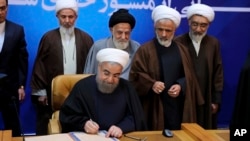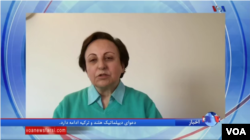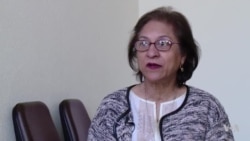A U.N. investigator presenting her first report on Iran's human rights record says Iranian leaders have made some progress, but must do more to stop what she calls the "persecution" of Iranian people.
In an exclusive interview with VOA Persian in Geneva on Monday, U.N. special rapporteur on Iran's human rights situation Asma Jahangir credited Iran for boosting engagement with her office.
"They are now responding to our communications more and more, which was not the case earlier," she said.
Jahangir, an independent Pakistani rights activist who took up her post last November, spoke to VOA on the day she presented her first Iran report to the Geneva-based U.N. Human Rights Council. "Iran gave extensive comments to my report (covering the second half of 2016) – whether I agreed with those comments is not the point. But at least there were the comments, and I learned a lot from them."
Jahangir also welcomed Iranian President Hassan Rouhani's signing of a Citizens' Rights Charter in December. The document emphasizes the Iranian people's freedoms of speech and assembly and rights to access information, health services, a clean environment and clean water.
Jahangir said Rouhani has appointed an official to pursue the aims of the charter. "We are looking at some improvements that may come about," she said. "For example we are hoping that the death penalty for juveniles will be ended and that some not-so-serious drug-related crimes will not be subject to capital punishment." Jahangir's report says Iran has executed at least 156 people since January, after carrying out at least 530 executions in 2016, mostly for drug offenses.
Jahangir also said information she has received from inside Iran indicates the charter has not been implemented effectively, so far. Iran has criticized the appointments of U.N. special rapporteurs on its rights record such as Jahangir and blocked them visiting, saying they rely on information from hostile sources. In her presentation to the Human Rights Council, Jahangir said she has relied on reports "received from Iranians living both inside and outside of Iran" as well as consultations with "civil society organizations and various stakeholders."
In a separate interview with VOA Persian's NewsHour show on Monday, exiled Iranian Nobel Peace prize winner Shirin Ebadi offered a theory as to why Iran is starting to cooperate with Jahangir. "Obviously, international pressure does make a difference in how Iran responds to allegations of human rights abuses," she said. "Previously, Iranian officials would not bother to respond to queries from the rapporteur, and would heap scorn and insults on this U.N. investigator – but now they feel obliged to respond to her."
Last week, U.N. High Commissioner for Human Rights Zeid Ra'ad al Hussein issued a separate report making criticisms of Iran's human rights record.
Speaking to VOA, Jahangir identified three areas in which she said Iran should make urgent changes to its policies.
On freedom of expression, she said "I'm really concerned about how people are arbitrarily detained, arrested, harassed and intimidated" for expressing themselves.
On the treatment of political prisoners, she said "torture is endemic" and sends a signal to the rest of the country that "if you don't agree or if you don't get into line, this is the treatment that you will get."
And on the independence of the judiciary, she said lawyers and judges have given "virtual impunity" to Iranian security forces and operate with an "official" mindset to the extent that "they don't seem to work independently at all."
VIDEO: Asma Jahangir talks about Iran's human rights record
Kazzem Qaribabadi, an Iranian judiciary official participating in the U.N. Human Rights Council meeting in Geneva, told Iran's official Fars news agency on Sunday that he will respond to Jahangir's allegations in the coming days.
Last week, Iranian foreign ministry spokesman Bahram Qassemi rejected Jahangir's report, first published on March 6, as politically motivated and ignoring Iran's responses to the alleged rights violations that she raised. Earlier this month, Fars quoted Iran's Deputy Foreign Minister Abbas Araqchi as telling the Human Rights Council that "Iran continues its efforts towards promotion of human rights based on the recognition of an interactive and cooperative approach at different levels."
Jahangir said her report was "not about naming and shaming" Iran. She said she recently met with members of the Iranian judiciary's human rights department and sought their input to make the report more balanced and offer "constructive solutions" to Iran's challenges.
The Pakistani activist also defended the report as "critical" to raising awareness of Iran's human rights situation among people inside and outside the country. "More importantly," she said, "it gives victims and activists inside Iran essential moral support – otherwise they are just being persecuted without any kind of an outlet to raise their voices."
Guita Aryan and Hooman Bakhtiar of VOA's Persian service contributed to this report.








